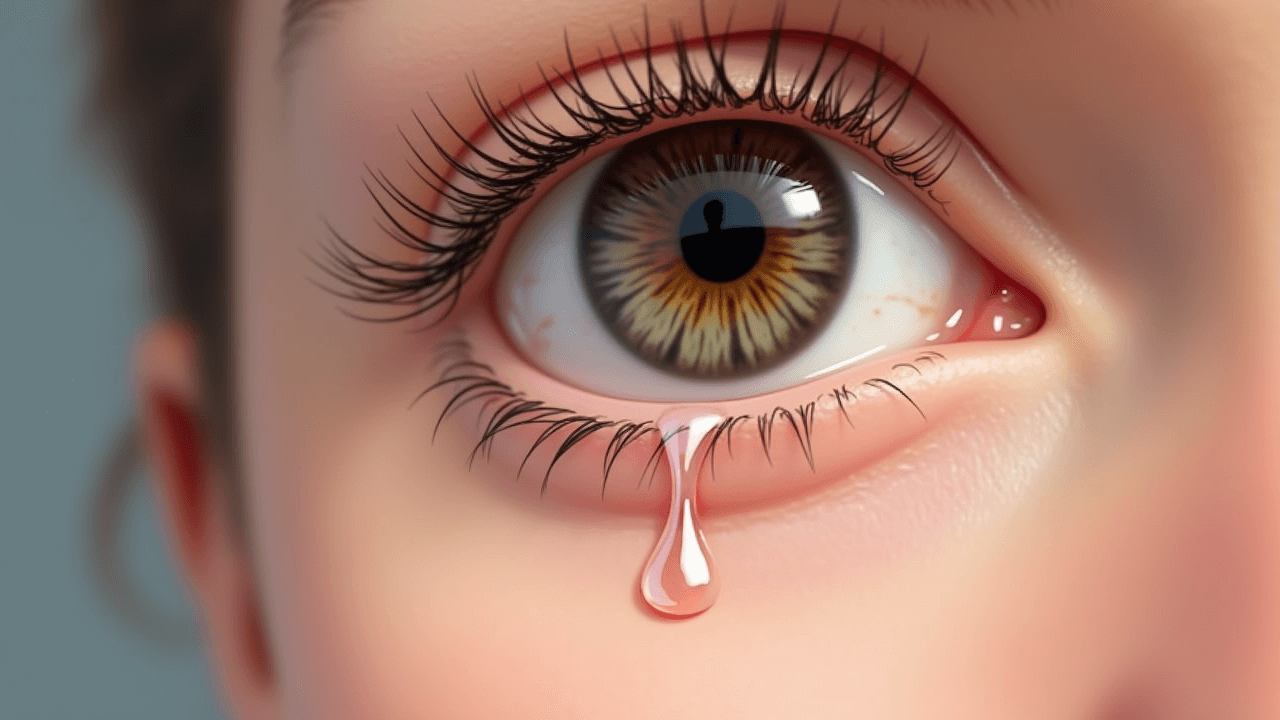Okay, so have you ever, like, gotten ready to cry and then, as the tears start coming, your eyes start burning? Is it just me? I always thought it was just the salt, but maybe it’s not that simple.
Some people say they’ve never even felt that burning sensation ever. And then there are others, like full-on saying it happens to them all the time. To help us kind of wade into this whole mystery of the burning tears, we’ve got our expert here. Welcome.
Thanks for having me.
So is it just the salt? What’s the deal?
The Role of Salt in Tears
It is true that tears contain salt, but that’s definitely not the whole picture. You know, like if you get salt in a cut, it stings way more than if you get it on your skin.
Oh, yeah, for sure.
So it’s kind of the same thing with your eyes. If your eyes are already irritated, then those tears, even though they’re supposed to help, can actually make it worse.
Dry Eyes and Irritation
And speaking of irritation, one of the most common reasons is dry eyes.
Yeah, some people don’t even realize they have dry eyes until they think about it, which, wow.
It’s actually more common than people think. Basically, dry eye is when your eyes don’t make enough lubrication—those tears—or sometimes your tears just evaporate too quickly. Either way, it leaves your eyes feeling gritty and irritated.
So then the tears come along, and it’s like, bam, extra burn.
Exactly. Think of it like if you had a scratch on your arm and then rubbed salt water in it.
Ouch. Yeah, definitely not doing that.
Right. And with dry eyes, your eyes are already kind of in that scratched state.
Effects of Makeup and Skincare Products
And it’s not just what’s inside the tears themselves, right? Like, people were talking about all the stuff we put on our faces—makeup, sunscreen, even just natural skin oil.
Absolutely. Our eyes are really sensitive. And when you add in things like makeup and sunscreen, which can have fragrances, chemicals, all that stuff, it can be a recipe for some serious irritation.
Oh, for sure. Remember being a teenager and experimenting with all sorts of products?
Exactly. What might be totally fine for one person could be a nightmare for someone else.
The First Tear Phenomenon
And speaking of different experiences, one thing that really struck me was how many people were talking about when the tears fall making a difference—like that first tear being the worst.
Oh, yeah, the first tear phenomenon.
Yes! It’s like that first sip of a really cold drink just hits you differently. But with tears, it’s like a bad kind of hit, you know?
Exactly. It could be because of that sudden change in moisture we were talking about—that shift from dry to wet.
Makes sense. Our bodies don’t always like to be surprised.
Exactly. And there might even be a little bit of an osmotic effect happening too.
Osmosis and Eye Sensitivity
Osmosis, like in biology class?
Exactly. It’s like when you go swimming in the ocean and your eyes sting. A little part of that is osmosis—the water moving across cell membranes trying to balance the salt concentration.
So maybe those first few tears are like, “Hey, we’re here to change the salt game,” and our eyes are like, “Whoa, hold on, we need to eject!”
Pretty much.
Allergies and Burning Tears
But you know, one of the most interesting things is the connection to allergies.
Right, the allergies. A bunch of people were saying that allergies can make your tears burn like crazy, even if you’re not actively around the allergen anymore.
And when you think about it, it makes sense because when you have an allergic reaction, it’s not just your nose or whatever—your whole body’s involved, right? Including your eyes.
Okay, so it’s like your body’s freaking out about the allergen, and the eyes are just like, “We gotta do something.”
Exactly. And during an allergic reaction, your body releases these chemicals—histamines.
Histamines, yeah, right. And those cause inflammation, which can make your eyes super sensitive.
So it’s kind of like how your nose gets all stuffy and itchy during allergy season.
Exactly the same thing. Your eyes are lined with the same receptors as your nose, so when those tears come into contact with the eyes, it can be, well, not pleasant.
Individual Differences in Tear Burning
There’s this one story—it was kind of funny, actually—about this person who thought honey was spicy. Turns out they were allergic.
See, and that’s the thing—everyone’s different. So what might seem totally normal to one person could be a completely different experience for someone else.
Totally. And I think that’s what’s been so interesting about this whole deep dive. We started with this really simple question: Why do tears burn? And it turns out there’s no single answer. We’ve got dry eyes, we’ve got all the stuff we put on our faces, that first tear thing, allergies—it’s a lot.
It really is. And it just goes to show, even with something as, I don’t know, universal as crying, there’s so much variation in how people experience it.
So, of everything we’ve talked about, what do you think is the most surprising thing you’ve learned?
Final Thoughts
Good question. I think for me, it’s just how many different things can cause that burning sensation. Like, it really makes you realize that our bodies are these super complex systems where everything’s connected.
That’s a good point. And it makes you realize that something as simple as crying can be affected by so many things—like what’s going on in our environment, our own individual biology, all of it.
It’s true. And you know, it’s really important to remember that all this stuff we’re talking about, it’s not a replacement for actual medical advice.
Oh, for sure. As much as we love geeking out over dry eyes and osmosis and all that, it’s definitely not the same as talking to a doctor. Right? What I’m saying is, if you’re having a lot of issues with burning eyes, definitely talk to a professional.
Good advice.
So I guess next time we see someone crying, we should probably skip the whole “it’s just salt” thing.
Probably a good call, because it could be the salt, sure, but it could also be like a million other things.
Exactly—a little bit of dry eye, some leftover makeup, who knows? It’s different for everyone. And I think it’s important to remember that.
For sure. It’s more about just, you know, being there for the person than trying to explain the science of tears, right?
Exactly. Sometimes a listening ear is more helpful than any explanation.
FAQs
Why do my eyes burn when I cry?
There are several reasons why your eyes might burn when you cry. It could be due to the salt in your tears irritating already dry or sensitive eyes. It might also be because of makeup or skincare products around your eyes, allergies causing inflammation, or even the sudden change in moisture.
Can dry eyes cause tears to burn?
Yes, dry eyes can cause your tears to burn. When your eyes don’t produce enough lubrication, they become irritated. When tears do come, they can sting or burn because the eyes are already sensitive.
Does makeup contribute to burning tears?
Absolutely. Makeup and skincare products around the eyes can contribute to irritation. Ingredients like fragrances and chemicals in these products can cause your eyes to become more sensitive, leading to a burning sensation when you cry.
Are allergies a reason for burning eyes when crying?
Yes, allergies can cause your eyes to burn when you cry. During an allergic reaction, your body releases histamines, which cause inflammation. This makes your eyes more sensitive, and tears can exacerbate the burning sensation.
Is the burning sensation only in the first few tears?
Some people experience a phenomenon where the first few tears burn more than the subsequent ones. This could be due to the sudden change in moisture or osmotic effects as your eyes adjust to the increased tear production.
Your Hosts

Alex & Maria
Join Alex Thompson and Maria Davis as they navigate the fascinating world of knowledge. With their combined expertise and passion for learning, they simplify the complex and make every episode a journey worth taking.

